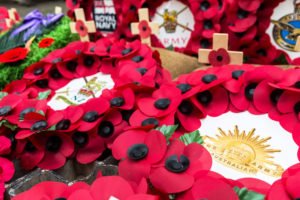Remembrance Day – Legacy speech
Ladies and Gentleman, thank you very much. It’s a great honour to be with you today on this special occasion.
I acknowledge the President of Sydney Legacy, Legatee Greg Wrate; Contemporary widow Gwen Cherne, who has worked tirelessly to help build a better future for military families; Commanding Officer HMAS Canberra, Captain Ash Papp; and Rhondda Vanzella, President of the War Widows Guild NSW.
100 years ago on Sunday, the guns on the Western Front fell silent, after more than four years of continuous warfare.
The most destructive war in the modern era.
The legacies of WWI resonated into and through the Second World War, and remain with us today.
This Remembrance Day we pause for the 100th time, to remember.
To remember the 60,000 Australian lives lost and hundreds of thousands who returned home – but physically and mentally scarred.
Their lives irrevocably changed.
As Legacy knows only too well, war does not just impact those who serve our nation in uniform.
It also impacts on those who loved them.
So on Remembrance Day we also commemorate and thank their loved ones.
Families, friends and sweethearts who grieved for those who never returned and also for those who returned – but wounded and changed – both physically and mentally.
On the 28th of June 1914, 19-year-old Gavrilo Princip shot and killed Archduke Franz Ferdinand – the heir to the Austro-Hungarian throne.
It was an event that unleashed hell – killing 37 million people from 40 countries, including more than 60,000 young Australians.
When they left our shores, for their big adventure on behalf of king and country, Australia was a new nation of less than five million citizens.
One in every two men of military age voluntarily enlisted, more than a quarter of a million went overseas, and one in five never came home.
As many as one third of the dead have no known grave, and for each one there was a grieving wife, mother, father, sweetheart, brother and sister who could not bury their loved one.
My grandfather, Alfred George Reynolds, was one of the young soldiers who departed Albany in Western Australia in the first convoy, on the 1st of November 1914.
He did not return to Australia until December 1918.
Alf had a regimental number of Q52 – and it was in Brisbane that his entire class of wool classing students went and enlisted together.
He was on the first landing at Gallipoli, a Three Field Ambulance medic, who, against all odds, served not only throughout Gallipoli but also the Western Front, Fromelles, Somme, Pozieres, Ypres and Amiens.
He was one of only a handful of original Gallipoli diggers to serve through the war.
Unlike so many of his mates, he returned home alive. Physically, except for a limp, he was intact. But mentally, he was terribly scarred.
My grandfather’s story was one of many captured through the Centenary of ANZAC.
But sadly, many stories have been lost to time.
In 2015, my Dad and two brothers and I were fortunate enough to win tickets in the national ballot to participate in the Gallipoli Centenary commemorations.
After the official commemorations had concluded and the world’s eyes had moved away from Gallipoli, my family and I continued to tour the battlefields and war cemeteries, to gain a greater understanding of the Gallipoli campaign.
As a family we hoped to learn more about what my grandfather may have experienced, and to fill in large gaps in our knowledge of his four years at war.
Sadly, he passed away long before I was able to ask him these questions myself.
There was a particularly moving moment during my trip that highlights the strong bond and pride those who made the journey to Gallipoli felt, as descendants of ANZACS.
I met two brothers at the Shrapnel Valley Cemetery, who were locating and individually dressing the gravestones of every single man whom their grandfather, a chaplain at Gallipoli, had buried.
The efforts they went to, to personalise each and every one of these gravestones, and the respect they showed these men, I will never forget.
There were several rows of heartbreaking messages that had been placed by grieving family members on gravestones of their loved ones.
They had to pay a penny and a half, per line, to try to both capture the life and untimely death of their loved one, and make sense of their loss.
‘Some day. Some time. We will understand. Mother,’ was just one of the many heartbreaking tributes.
One of the most wonderful things I took away from that trip was the stories that we shared with each other.
They were stories not only of my own family, but of everybody else there whom we encountered.
Strangers shared their stories on aeroplanes, in cafes and in hotel lobbies.
While many said they had made the pilgrimage to honour their own family members – others could not find the words to explain why they had felt so compelled to make the journey.
For my grandfather and his family, the most visible evidence of war was his anger and lifelong battle with what today we call post-traumatic stress disorder.
He spent a lifetime supporting his mates hospitalised in Shenton Park for ‘shellshock’, because as a battlefield medic, he understood the impact of war on the mind – and particularly the noise of constant bombardment.
After the war, he went on to do many things in his long life in Western Australia.
He married, was widowed, married again and had seven children, the youngest being my father Laith.
He was a wool classer, a sheep and wheat farmer in Mukinbudin, an accountant in Albany and even a politician – a Labor politician – in the WA State parliament.
His story is one of many now shared in the Albany Anzac Centre.
But like so many veterans he neither valued mementos of war nor rarely spoke of his experiences – he tried hard to forget.
But clearly never could.
And my dad, like so many family members, loved his dad but never really understood his moods.
None of us can ever truly understand what our returned service men and women experienced in war – but reading the stories of Gallipoli veterans while walking the ground with my father and my brothers – the same ground my grandfather walked 100 years ago – provided us with just a slightly greater insight into what he may have experienced.
While the stories of the lives of these men, who loved and who were loved, will not all be individually remembered because of time – because of that trip many more will now be remembered, and their stories passed on.
At the first anniversary of the Armistice, King George the 5th made a decree that all people across the British Empire should seize what they are doing at the hour of the Armistice, which stayed the world-wide carnage of the four proceeding years and marked the victory of right and freedom.
The anniversary of the Armistice, Remembrance Day, has become representative of all the sacrifices by our armed forces that right and freedom prevails.
For 100 years we have said the words ‘Lest We Forget’ at the end of the ode to remembrance.
But I am sure many others have not always fully appreciated this solemn caution to us all – a caution not to forget the service and the sacrifice of all our returned service men and women, and also not to forget the lessons of war.
An anonymous Australian schoolchild’s note, left on the shrine at Lone Pine, poignantly captures “Lest we forget” with the words:
To all the soldiers who’s stories are untold (love heart) sending love and thoughts.
But I believe ‘Lest we forget’ also captures and shares the individual stories of those who have served – so that their families can individually remember and honour them all.
And it is then, as a nation we are able to commemorate them all.
We know that many, who return from war, do not leave those battlefields behind. Like my grandfather, they bring the battles home with them – carrying them inside.
Too often these internal battles against depression, anxiety, Post-Traumatic Stress Disorder and suicide are fought and lost alone.
Mental health issues and alcohol abuse are prevalent, particularly among younger veterans.
Their private battles must become our cause.
In 2013 around 150,000 veterans with service related disabilities were being supported by the Department of Veterans Affairs.
Of these, more than 40,000 had an accepted mental health disorder.
It is clear many veterans struggle to adjust to civilian life, and without the proper support, they can spiral into deep depression.
It’s not just an obligation, but our duty, to care for our service men and women – and extend that support to their families.
Although there have been enormous developments in improving the effectiveness of the discharge and transition out of service process –more still needs to be done.
For more than 90 years, Legacy has been at the forefront of caring for the families’ of veterans.
In the words of the great Sir Rodin Cutler, ‘Legacy is not a charity. It is a continuation of comradeship engendered by war service in defence of Australia.
‘It is unique in that membership is by invitation, members are almost unknown to the public as Legatees; and indeed Legacy can only continue because of the overriding criterion of Membership is “service above self”.’
Rehabilitation, as much as it is possible, must be the paramount consideration regarding the veteran – an aspect strongly supported by Legacy.
Organisations such as the War Widows Guild are just as important in offering further support – its mission to promote and protect the interests of war widows.
But support can also be found in other forms – including sport.
The Invictus Games highlighted the power of sport to motivate recovery, support rehabilitation and generate a wider understanding of the sacrifices made by the men and women who currently serve, or have served their country.
This year’s Games was an opportunity for all competitors to focus on what they can achieve – and celebrate their unconquered spirit.
As Sir Rodin Cutler observed, Invictus is the continuation of comradeship engendered by war service.
One of the many wonderful things about welcoming the Australian Invictus team to Canberra was welcoming their 200 strong support team – their family and friends who made their service possible – and now supporting their recoveries.
In conclusion, I believe it is our duty to guard the legacy of the sacrifice and service of every man and woman who defends us, our freedom and our values.
On their return to Australia, and to their families, we must ensure that the values and principles they fought to defend are not eroded.
The men and women of our Australian Defence Force deserve nothing less.
It is incumbent upon us to use their service and sacrifice to build a better, safer Australia.
An Australia where our democracy is secure, where people are meaningfully occupied, and where, because of our economic strength, we can – with compassion – provide comfort and dignity to those in genuine need.
This Remembrance Day we remember the service and sacrifice of all men and women who have fought for us.
For those who returned home, many with broken limbs, minds and spirits.
For the families who in some way lost their loved ones.
For those who continue to serve.
And for them, we must also remember their stories.
Lest we forget.



